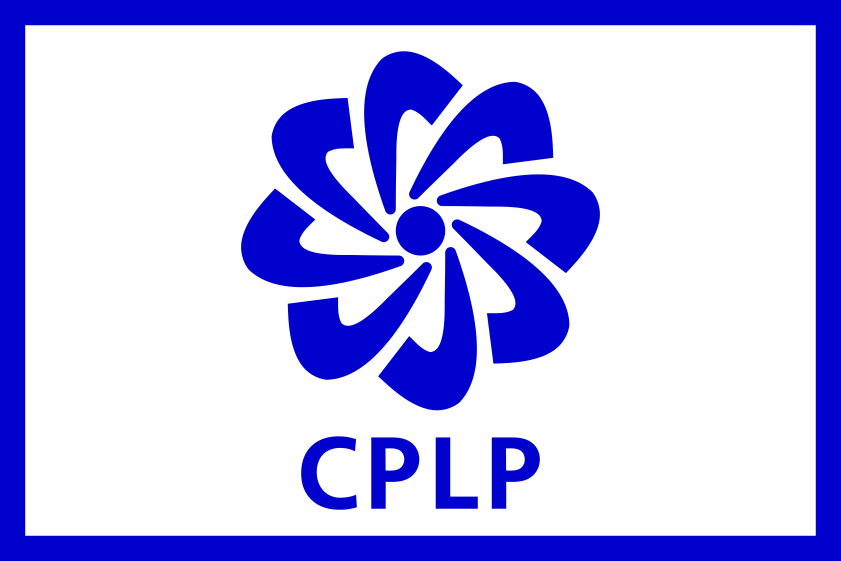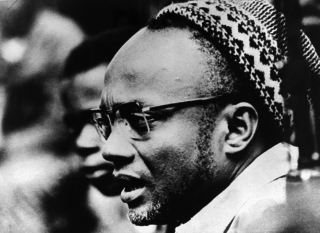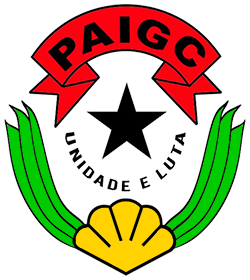Telecommunications in Guinea-Bissau include radio, television, fixed and mobile telephones, and the Internet.

The Community of Portuguese Language Countries, also known as the Lusophone Commonwealth, is an international organization and political association of Lusophone nations across four continents, where Portuguese is an official language. The CPLP operates as a privileged, multilateral forum for the mutual cooperation of the governments, economies, non-governmental organizations, and peoples of the Lusofonia. The CPLP consists of 9 member states and 19 associate observers, located in Europe, the Americas, Asia, and Africa.
The music of Guinea-Bissau is most widely associated with the polyrhythmic genre of gumbe, the country's primary musical export. Tina and tinga are other popular genres.

Amílcar Lopes da Costa Cabral was a Bissau-Guinean and Cape Verdean agricultural engineer, intellectual, poet, theoretician, revolutionary, political organizer, nationalist and diplomat. He was one of Africa's foremost anti-colonial leaders.

The African Party for the Independence of Guinea and Cape Verde is a political party in Guinea-Bissau. Originally formed to peacefully campaign for independence from Portugal, the party turned to armed conflict in the 1960s and was one of the belligerents in the Guinea-Bissau War of Independence. Towards the end of the war, the party established a Marxist–Leninist one-party state, which remained intact until multi-party democracy was introduced in the early 1990s. Although the party won the first multi-party elections in 1994, it was removed from power in the 1999–2000 elections. However, it returned to office after winning parliamentary elections in 2004 and presidential elections in 2005, since which it has remained the largest party in the National People's Assembly.
RTP Internacional is the international television service of Rádio e Televisão de Portugal, the Portuguese public broadcaster. It shows a mix of programming from RTP's domestic channels, together with special Contacto programmes aimed at Portuguese migrant communities in Europe, Africa, South America and North America, as well as Macao and East Timor.

Portuguese is spoken in a number of African countries and is the official language in six African states: Angola, Mozambique, Guinea-Bissau, Cape Verde, São Tomé and Príncipe and Equatorial Guinea. There are Portuguese-speaking communities in most countries of Southern Africa, a mixture of Portuguese settlers and Angolans and Mozambicans who left their countries during the civil wars. A rough estimate has it that there are about 14 million people who use Portuguese as their sole mother tongue across Africa, but depending on the criteria applied, the number might be considerably higher, since many Africans speak Portuguese as a second language, in countries like Angola and Mozambique, where Portuguese is an official language, but also in countries like South Africa and Senegal, thanks to migrants coming from Portuguese speaking countries. Some statistics claim that there are over 30 million Portuguese speakers in the continent. Like French and English, Portuguese has become a post-colonial language in Africa and one of the working languages of the African Union (AU) and the Southern African Development Community (SADC). Portuguese co-exists in Guinea-Bissau, Cape Verde, and São Tomé and Principe with Portuguese-based creoles, and in Angola, Mozambique, and Guinea-Bissau with autochthonous African languages.

The Portuguese-speaking African countries, also known as Lusophone Africa, consist of six African countries in which the Portuguese language is an official language: Angola, Cape Verde, Guinea-Bissau, Mozambique, São Tomé and Príncipe and, since 2011, Equatorial Guinea. The six countries are former colonies of the Portuguese Empire. From 1778 until independence, Equatorial Guinea was also a colony of the Spanish Empire. In 1992, the five Lusophone African countries formed an interstate organisation called PALOP, a colloquial acronym that translates to African Countries of Portuguese Official Language. The PALOP countries have signed official agreements with Portugal, the European Union and the United Nations, and they work together to promote the development of culture and education and the preservation of the Portuguese language. Together with Portugal and Brazil in 1996, the Portuguese-speaking African countries established the Community of Portuguese Language Countries, which East Timor later joined in 2002 and Equatorial Guinea in 2014.
Mateus Galiano da Costa, known simply as Mateus, is an Angolan professional footballer who plays for Portuguese club Boavista F.C. as a forward.

The Lusofonia Games is a multinational multi-sport event organized by the ACOLOP, which involves athletes coming from Lusophone (Portuguese-speaking) countries, most countries competing are countries that are members of the CPLP, but some are countries with significant Portuguese communities or have a history with Portugal

The Radiotelevisão Caboverdiana is Cape Verde's first radio and television station broadcasting local programs from Cape Verde, Portugal and Brazil as well as the rest of the world especially France. It is a publicly owned company and enterprise and is located in the Capeverdean capital city of Praia, in the southern part in the middle of Achada Santo António RTC also has a few buildings, it also has offices in São Vicente, Sal, São Filipe on Fogo Island and Assomada in Santa Catarina. The building size is very small, only like local affiliates in North America as well as Latin America, Australia and Europe. The radio building is in the south on Rua 13 de Janeiro and the television station is in the north. Its current president is José Emanuel Tavares Moreira/

The Comunidade do Escutismo Lusófono is the international community of Scouting organizations in the Lusophone countries. Its members are:

Guinean Portuguese is the variety of Portuguese spoken in Guinea-Bissau, where it is the official language.
RDP África is a terrestrial radio station owned by Rádio e Televisão de Portugal broadcasting to Lusophone African countries with programming such as Lusophone African music, as well as Portuguese music and Brazilian music, with update reports from the Lusophone African recording world.

Televisão Pública de Angola E.P. or TPA is the national broadcaster of the Southern African state of Angola. It also operates an international channel TPA Internacional. TPA is headquartered in the capital city Luanda and broadcasts in Portuguese language. The international channel broadcasts selected shows targeted at foreign audiences and the Angolan community abroad.

On 12 April 2012, a coup d'état in Guinea-Bissau was staged by elements of the armed forces about two weeks before the second round of a presidential election between Carlos Gomes Júnior and Kumba Ialá. The coup started in the evening with military personnel and equipment making its way onto the streets, followed by the state-owned media being taken off-air.

Cape Verde–Guinea Bissau relations refers to the bilateral relationship between the Republic of Cape Verde and the Republic of Guinea-Bissau. Cape Verde is an island country about 900 km north-west of Guinea-Bissau, a coastal West African country. Both were colonies of the Portuguese Empire and they campaigned together for independence with a plan for unification, but the countries separated after 1980.
Manuel Ferreira was a Portuguese writer.
Mass media in Guinea-Bissau includes print, radio, television, and the Internet. "The Conselho Nacional de Comunicação Social regulates the press." The government-run Radio Televisao de Guinea-Bissau began in 1973.


















